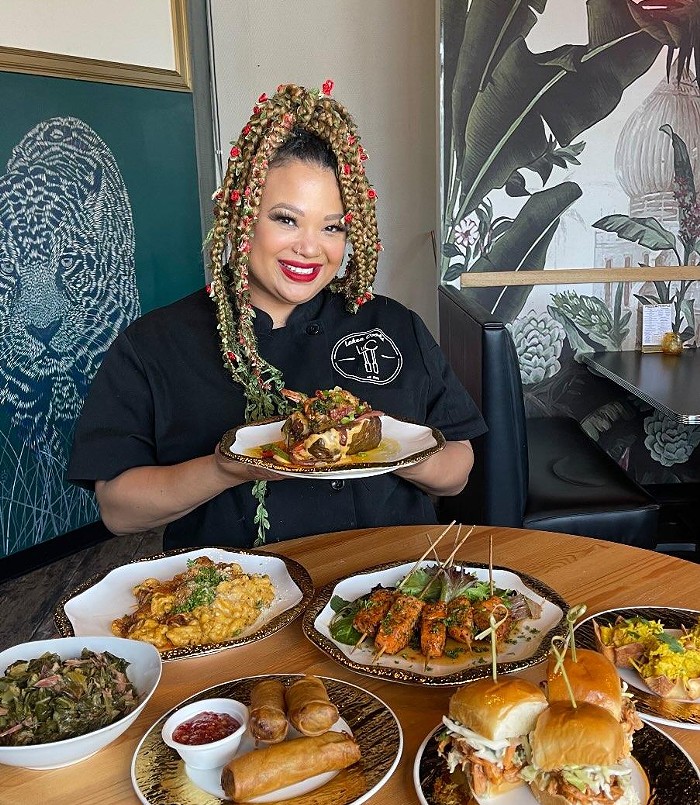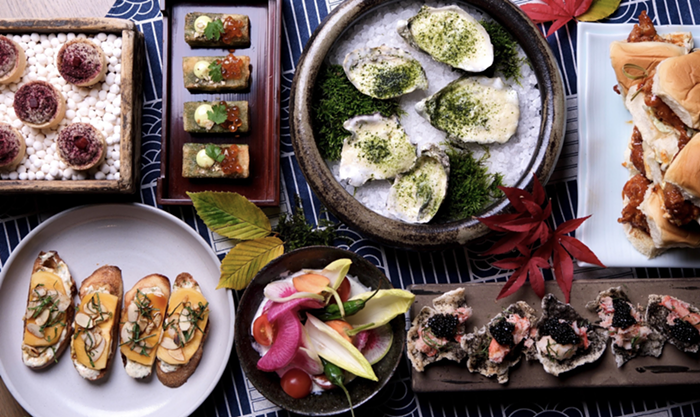Every vegetarian experience at Sutra—and every review of the vegetarian experience at Sutra—begins with a gong. This gong is struck just prior to the first course of a preset, prix fixe menu ($28–$35) that changes daily according to the "intuition and inspirations" of the chef, who's also a professional yoga instructor. The one constant, per Sutra's highly explanatory website: Sutra's dedication to elevated vegetarian cuisine "with a menu that respects the changes of season, availability of local organic ingredients, and the experience of connecting to our communities in a holistic urban environment."
The night I visited the new Wallingford establishment—the night after the presidential election of Barack Obama, an evening for celebrating the holistic urban environment if ever there was one—the banging of the gong was preceded by the speaking of the chef, a friendly thirtysomething man of macrobiotic thinness who encouraged us to take a moment to appreciate this communal gaining of sustenance and acknowledge the work of the farmers who grew the components of the food we were about to enjoy. How you feel about this kind of predining monologue-with-gong is a good gauge of how you'll feel about Sutra as a whole. If the cycle of life sounds like the perfect aperitif, you're golden; if you like your dinner unaccompanied by earnest, well-meaning discourse, Sutra is not for you.
Meals at Sutra are programmed affairs, with diners seated around spare, elegant communal tables for dinner served twice nightly Wednesday through Saturday, with a maximum of 35 diners at each seating. With its organic vegetarian (and 90 percent vegan) menu, centering visualizations, and scheduled feedings, Sutra is an unapologetic specialty restaurant: The narrow focus is the point.
The night I visited, the gong was followed by a light four-course meal ($33) commencing with a broccoli-pesto-mung-bean quiche, a tantalizing construct in which the mung beans played the eggs, the broccoli and pesto played themselves, and all the savory bits collided nicely with the quiche's lightly sweet almond-poppy-seed crust. Even my typically carnivorous dining companion put it away with pleasure.
Things took a bumpier turn with the second course, a pumpkin soup garnished with a kalamata olive/Honeycrisp apple/pickled pepper caponata. Like the quiche, the soup was served at room temperature; unlike the quiche, the soup cried out for one of a thousand organic herbs and spices, or at least salt and pepper, which were conspicuously not on offer—a bold statement for a vegetarian restaurant, and a borderline cruel one. I made do with the bright and spicy caponata, which added a kaleidoscopic kick to the otherwise unremarkable soup, but my dining companion quit after just a couple spoonfuls, devoting himself instead to our bottle of wine (which, though just an uncomplicated rosé, drove home the soup's want for flavor).
By the third course—a lasagna composed of chanterelle mushrooms, baby carrots, and creamed spinach, with a smoked tomato-sage marinara and a pomegranate-balsamic reduction—I wondered if lukewarm blandness, perhaps in pursuit of some yoga-derived flavor-stasis ideal, was Sutra's goal. Like the soup, the mushy lasagna cried out for help, but the lack was even more glaring: The sweetish reduction went in the wrong direction, and even the marinara was without any kind of savory punch. Organic chanterelles are wonderful, but homey old garlic and onion would've worked wonders.
The fourth-course dessert—a chunk of honey-hibiscus-macadamia-nut fudge, served just a touch colder than everything else—brought things back to the success of the first course, thanks primarily to accompanying coffee, a rich, strong roast from Pangaea Organica that gave the sweetness of the dessert some real dimension (and that was the first thing since the quiche to dwell in the same flavor-realm as the wine). As we finished our meals, I overheard the chef discussing this coffee with a diner, praising its "cleanness" and lack of impact on his gastrointestinal system.
The chef's dining-room dissertation on his bowels suggested a theory about the food's lack of heat and spark and flavor. As is perhaps befitting for a restaurant that's an offshoot of a yoga studio, Sutra's outlook includes not only gratitude to the producers but an eye on the final, postdigestion product. While what happens in between can seem secondary, the namasté vibe will be as important to Sutra's fans as the food. And while criticizing the place feels a bit like punching a hippie for giving you a daisy, it's worth noting that daisies don't come with a $33 price tag. ![]()



















